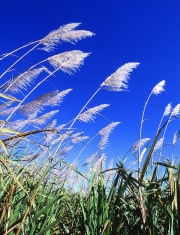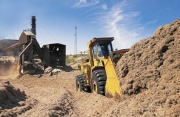Difference between revisions of "Bagasse"
Jump to navigation
Jump to search
(username removed) |
|||
| Line 2: | Line 2: | ||
== Description == | == Description == | ||
| − | Originally, the term bagasse was applied to any residual fibers from the processing of numerous plants and fruits such as olives, palm nuts, grapes, [ | + | Originally, the term bagasse was applied to any residual fibers from the processing of numerous plants and fruits such as olives, palm nuts, grapes, [[sisal]], sugarcane, and sugar beets. Currently, the term bagasse only refers to the dry, fibrous residue left from the stalks of sugarcane, ''Saccharum officinarum'', after the sugar has been extracted. Bagasse is composed of [[cellulose]] (50%), pentosan (25%) and [[lignin]] (25%). It is used in the production of [[paper%20pulp]], [[fiberboard|fiberboards]], [[insulation]], [[acoustical%20tile]], and animal feed. |
[[File:bagasse-pic.jpg|thumb|Bagasse pile]] | [[File:bagasse-pic.jpg|thumb|Bagasse pile]] | ||
| + | |||
== Synonyms and Related Terms == | == Synonyms and Related Terms == | ||
Revision as of 09:59, 8 January 2014
Description
Originally, the term bagasse was applied to any residual fibers from the processing of numerous plants and fruits such as olives, palm nuts, grapes, Sisal, sugarcane, and sugar beets. Currently, the term bagasse only refers to the dry, fibrous residue left from the stalks of sugarcane, Saccharum officinarum, after the sugar has been extracted. Bagasse is composed of Cellulose (50%), pentosan (25%) and Lignin (25%). It is used in the production of Paper pulp, fiberboards, Insulation, Acoustical tile, and animal feed.
Synonyms and Related Terms
megass; bagazo (Esp.); Saccharum officinarum (sugarcane)
Hazards and Safety
Dust is flammable. Inhalation of dust may cause pneumonitis or asthma.
Additional Images
Authority
- R. J. Gettens, G.L. Stout, Painting Materials, A Short Encyclopaedia, Dover Publications, New York, 1966
- Richard S. Lewis, Hawley's Condensed Chemical Dictionary, Van Nostrand Reinhold, New York, 10th ed., 1993
- Boise Cascade Paper Group, The Paper Handbook, Boise Cascade, Portland OR, 1989
- Matt Roberts, Don Etherington, Bookbinding and the Conservation of Books: a Dictionary of Descriptive Terminology, U.S. Government Printing Office, Washington DC, 1982
- The Dictionary of Paper, American Paper Institute, New York, Fourth Edition, 1980
- E.J.LaBarre, Dictionary and Encyclopedia of Paper and Paper-making, Swets & Zeitlinger, Amsterdam, 1969
- Random House, Webster's Encyclopedic Unabridged Dictionary of the English Language, Grammercy Book, New York, 1997
- The Merck Index, Martha Windholz (ed.), Merck Research Labs, Rahway NJ, 10th edition, 1983 Comment: entry 970
- The American Heritage Dictionary or Encarta, via Microsoft Bookshelf 98, Microsoft Corp., 1998
- Encyclopedia Britannica, http://www.britannica.com Comment: "bagasse" Encyclopædia Britannica [Accessed September 19, 2001].
- Art and Architecture Thesaurus Online, http://www.getty.edu/research/tools/vocabulary/aat/, J. Paul Getty Trust, Los Angeles, 2000



